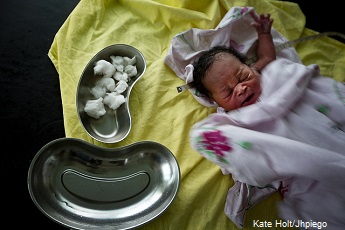Newborn Infection Prevention and Management
Newborns – especially those born prematurely and of low birth weight – can easily become infected with harmful pathogens encountered before, during and after birth. These infections account for nearly one-fifth of total newborn deaths globally.
To address this, MCSP infection and newborn sepsis management stressed strategies to reduce the opportunity for infection through improved intrapartum practices. This included handwashing by birth attendants, disinfection and sterilization of equipment, minimization of vaginal examinations, and prompt diagnosis and treatment of prolonged labor. Infection prevention also warrants early and exclusive breastfeeding, clean cord care (including umbilical applications of chlorhexidine), improved maternal health and nutrition, maternal and neonatal immunizations, and antibiotic prophylaxis.
Diagnosis of neonatal infection has remained a challenge, because sick newborns often present with non-specific signs and symptoms, and blood cultures. Where tests are available, they are positive in only 5-10% of suspected sepsis cases. Therefore, when there is suspected serious infection, the practice is to treat newborns presumptively with antibiotics.
Strengthening community-based capacity to deliver these treatments safely and effectively is a priority in rural and developing country contexts. Studies conducted in Africa and Asia suggest a simplified combination of injectable and oral antibiotic regimes are equally efficacious as conventional injectable regimes.
Based on a large body of evidence, the World Health Organization (WHO) released in 2015 a guideline for the management of Possible Serious Bacterial Infection when referral is not feasible or possible. MCSP worked with interested country programs to implement simplified antibiotic regimes for management of newborn sepsis through existing Integrated Management of Childhood Illness programs, thereby contributing to the implementation science both at national and global levels.

